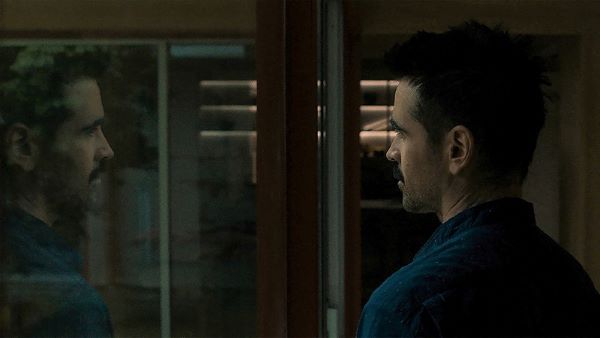![]() Neither dystopian or utopian, After Yang is a searching, intelligent sci-fi that deftly takes on themes of identity and otherness, grief, and memory. It’s a rare genre film that doesn’t rely on gimmicks, special effects and, frankly, audience expectations.
Neither dystopian or utopian, After Yang is a searching, intelligent sci-fi that deftly takes on themes of identity and otherness, grief, and memory. It’s a rare genre film that doesn’t rely on gimmicks, special effects and, frankly, audience expectations.
The Yang of the title is an android in the form of a young Chinese man, a technosapien. He was purchased by Jake (Colin Farrell) and Kyra (Jodie Turner-Smith) as a companion and a repository of Chinese cultural history for their adopted daughter Mika (Malea Emma Tjandrawidjaja) so she would have an understanding of her heritage. This arrangement seems to work until one morning when Yang stops functioning, and since the business where Yang was purchased no longer exists, Jake takes Yang to an unlicensed technosapien repairman, Russ (Ritchie Coster), found through the “I know a guy who knows a guy” method. Russ finds out the android’s core is damaged. He can open it up, but it would be illegal, and he believes spyware may have been involved in Yang’s breakdown.
If at this moment you assume you know where the film will be heading, you’d be wrong. It also turns out that Yang’s particular model has been discontinued. However, all technosapiens get to choose one minute of memory a day to save, and Jake manages to get access to those memories, and this is where After Yang really takes off. It is only when we are introduced to Yang’s memories that the story line moves away from his relationship with Jake and his family to Yang himself. Without spoiling anything too much, Jake discovers that Yang had an inner life and within that inner life is a mystery to solve. Jake has already been, according to his wife, distancing himself from his family, and this journey, which becomes obsessive, exasperates this estrangement. Farrell underplays Jake wonderfully. He pushes the inevitable mournful Farrell to the fore and shoves the more intensely unhinged Farrell (Seven Psychopaths) way to the rear. What results is a deep, complicated performance that never feels forced. Across the board, the nuanced performances are superb.
Yang is played by Justin H. Min, and the best way to describe his performance is delicate. Like the rest of writer/director Kogonada’s (the minimalist Columbus) film, it is quiet and pensive. There is no one bravura moment, it simply grows in power as we plumb the complication facing Yang’s crisis of identity. When Kyra asks Yang what he thinks about life after death, he responds optimistically but with the caveat: his beliefs may be programmed. A character that is introduced later on tells Jake that Yang wasn’t even sure if he was Asian.
Yang’s quest for identity is somewhat the point. Everyone here is trying to make sense of who they are and where they belong. It is not by accident that Jake is the only White person in the family—Kyra is Back. He is infused with Asian culture, and he owns a tea shop—as Yang points out, tea was invented in China—and the architecture of the family’s home has a decidedly Asian bent. Meanwhile, Kyra becomes more and more frustrated by her marriage and is clearly contemplating an exit. Mika, who had relied more and more upon the android because Jake had become more distant, spending time at the store, now no longer has a brother.
After Yang does not limit its ambitions. It confidently takes on grief and mourning. Ultimately, in its own humble way, it’s the most ambitious and moving sci-fi film since Denis Villeneuve’s Arrival. And it may be just as good.

















Leave A Comment